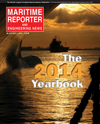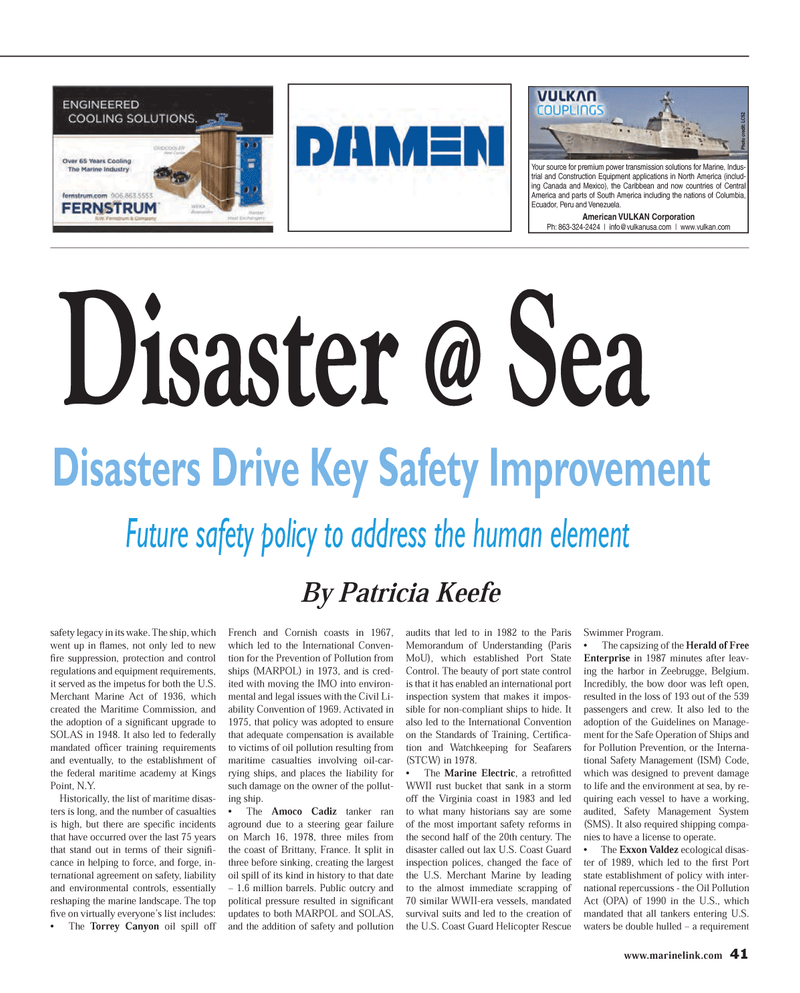
Page 41: of Maritime Reporter Magazine (June 2014)
Annual World Yearbook
Read this page in Pdf, Flash or Html5 edition of June 2014 Maritime Reporter Magazine
www.marinelink.com 41
American VULKAN Corporation
Ph: 863-324-2424 | [email protected] | www.vulkan.com
Your source for premium power transmission solutions for Marine, Indus- trial and Construction Equipment applications in North America (includ- ing Canada and Mexico), the Caribbean and now countries of Central
America and parts of South America including the nations of Columbia,
Ecuador, Peru and Venezuela.
Photo credit: LCS2
Disaster @ Sea
Disasters Drive Key Safety Improvement Future safety policy to address the human element
By Patricia Keefe safety legacy in its wake. The ship, which went up in ? ames, not only led to new ? re suppression, protection and control regulations and equipment requirements, it served as the impetus for both the U.S.
Merchant Marine Act of 1936, which created the Maritime Commission, and the adoption of a signi? cant upgrade to
SOLAS in 1948. It also led to federally mandated of? cer training requirements and eventually, to the establishment of the federal maritime academy at Kings
Point, N.Y.
Historically, the list of maritime disas- ters is long, and the number of casualties is high, but there are speci? c incidents that have occurred over the last 75 years that stand out in terms of their signi? - cance in helping to force, and forge, in- ternational agreement on safety, liability and environmental controls, essentially reshaping the marine landscape. The top ? ve on virtually everyone’s list includes: • The Torrey Canyon oil spill off
French and Cornish coasts in 1967, which led to the International Conven- tion for the Prevention of Pollution from ships (MARPOL) in 1973, and is cred- ited with moving the IMO into environ- mental and legal issues with the Civil Li- ability Convention of 1969. Activated in 1975, that policy was adopted to ensure that adequate compensation is available to victims of oil pollution resulting from maritime casualties involving oil-car- rying ships, and places the liability for such damage on the owner of the pollut- ing ship. • The Amoco Cadiz tanker ran aground due to a steering gear failure on March 16, 1978, three miles from the coast of Brittany, France. It split in three before sinking, creating the largest oil spill of its kind in history to that date – 1.6 million barrels. Public outcry and political pressure resulted in signi? cant updates to both MARPOL and SOLAS, and the addition of safety and pollution audits that led to in 1982 to the Paris
Memorandum of Understanding (Paris
MoU), which established Port State
Control. The beauty of port state control is that it has enabled an international port inspection system that makes it impos- sible for non-compliant ships to hide. It also led to the International Convention on the Standards of Training, Certi? ca- tion and Watchkeeping for Seafarers (STCW) in 1978. • The Marine Electric, a retro? tted
WWII rust bucket that sank in a storm off the Virginia coast in 1983 and led to what many historians say are some of the most important safety reforms in the second half of the 20th century. The disaster called out lax U.S. Coast Guard inspection polices, changed the face of the U.S. Merchant Marine by leading to the almost immediate scrapping of 70 similar WWII-era vessels, mandated survival suits and led to the creation of the U.S. Coast Guard Helicopter Rescue
Swimmer Program. • The capsizing of the Herald of Free
Enterprise in 1987 minutes after leav- ing the harbor in Zeebrugge, Belgium.
Incredibly, the bow door was left open, resulted in the loss of 193 out of the 539 passengers and crew. It also led to the adoption of the Guidelines on Manage- ment for the Safe Operation of Ships and for Pollution Prevention, or the Interna- tional Safety Management (ISM) Code, which was designed to prevent damage to life and the environment at sea, by re- quiring each vessel to have a working, audited, Safety Management System (SMS). It also required shipping compa- nies to have a license to operate. • The Exxon Valdez ecological disas- ter of 1989, which led to the ? rst Port state establishment of policy with inter- national repercussions - the Oil Pollution
Act (OPA) of 1990 in the U.S., which mandated that all tankers entering U.S. waters be double hulled – a requirement
MR #6 (40-49).indd 41 5/29/2014 9:18:46 AM

 40
40

 42
42
